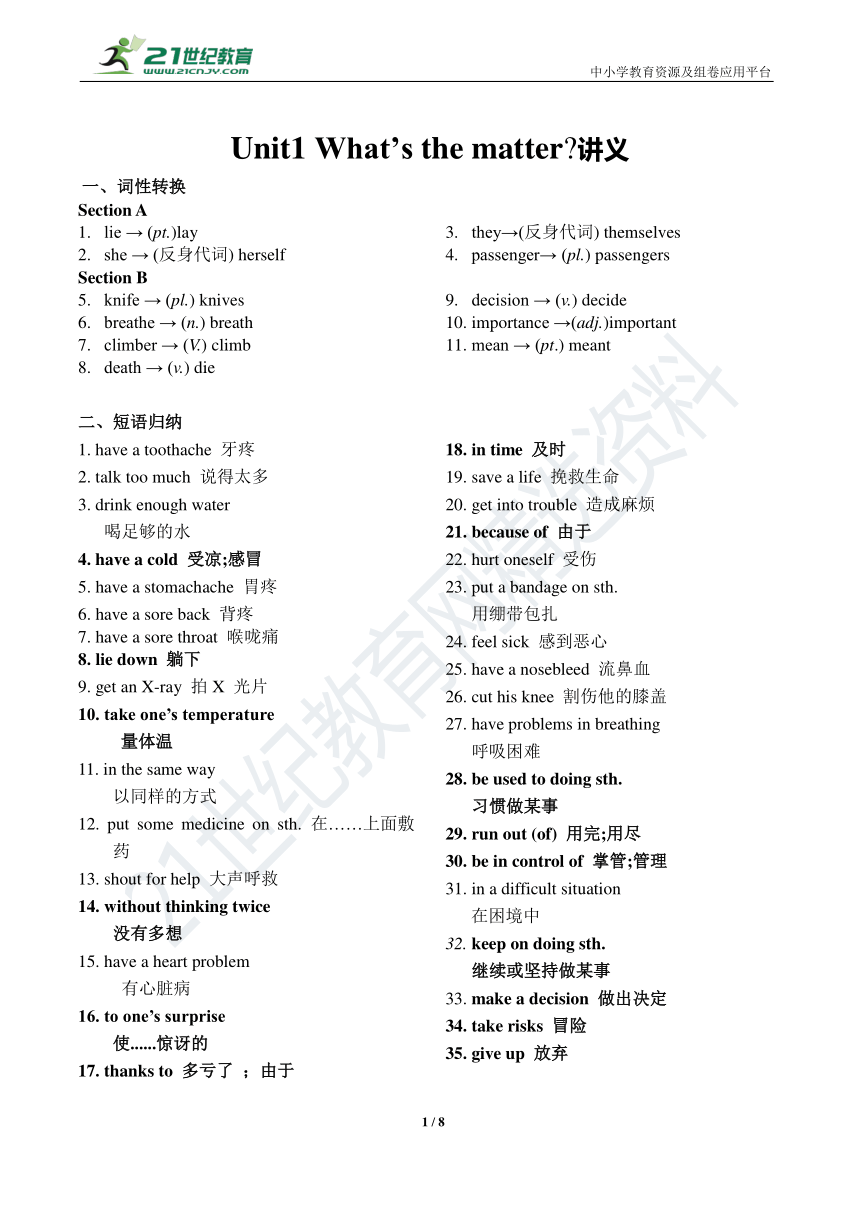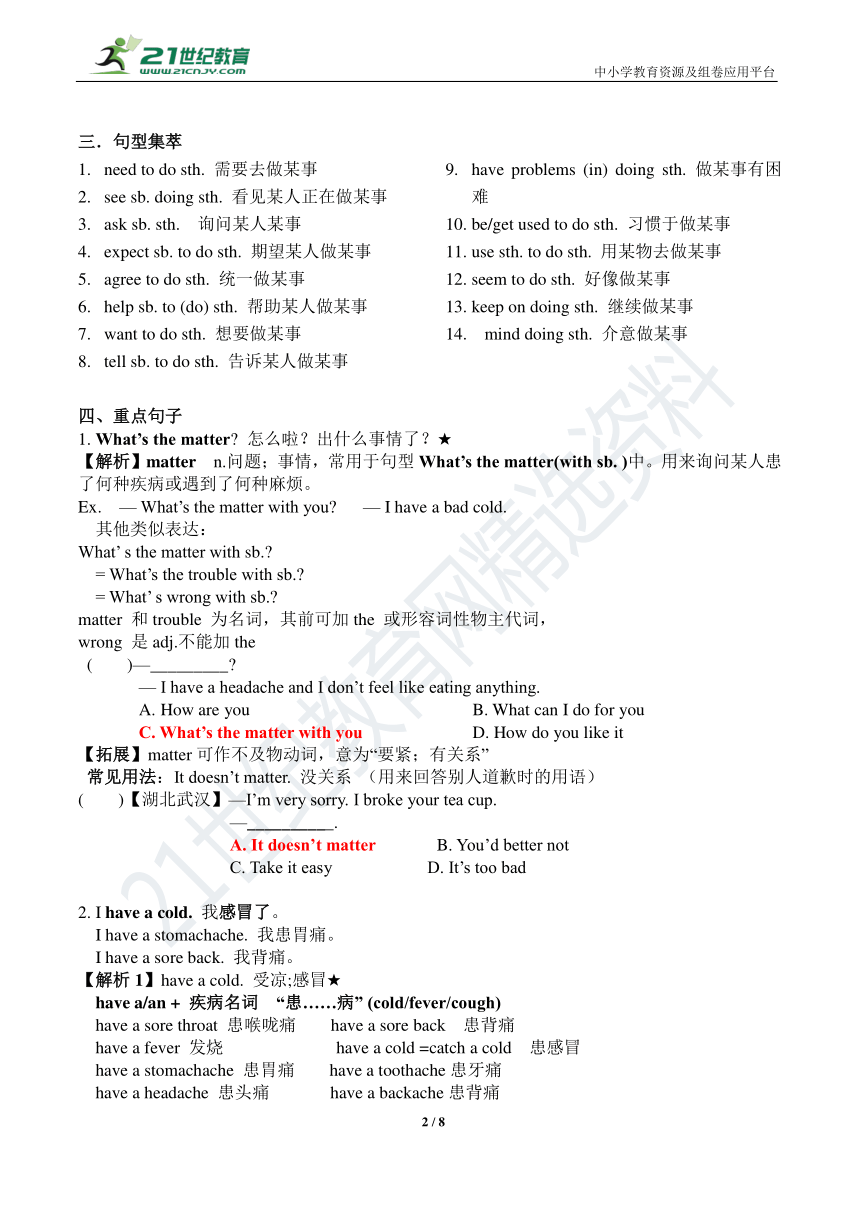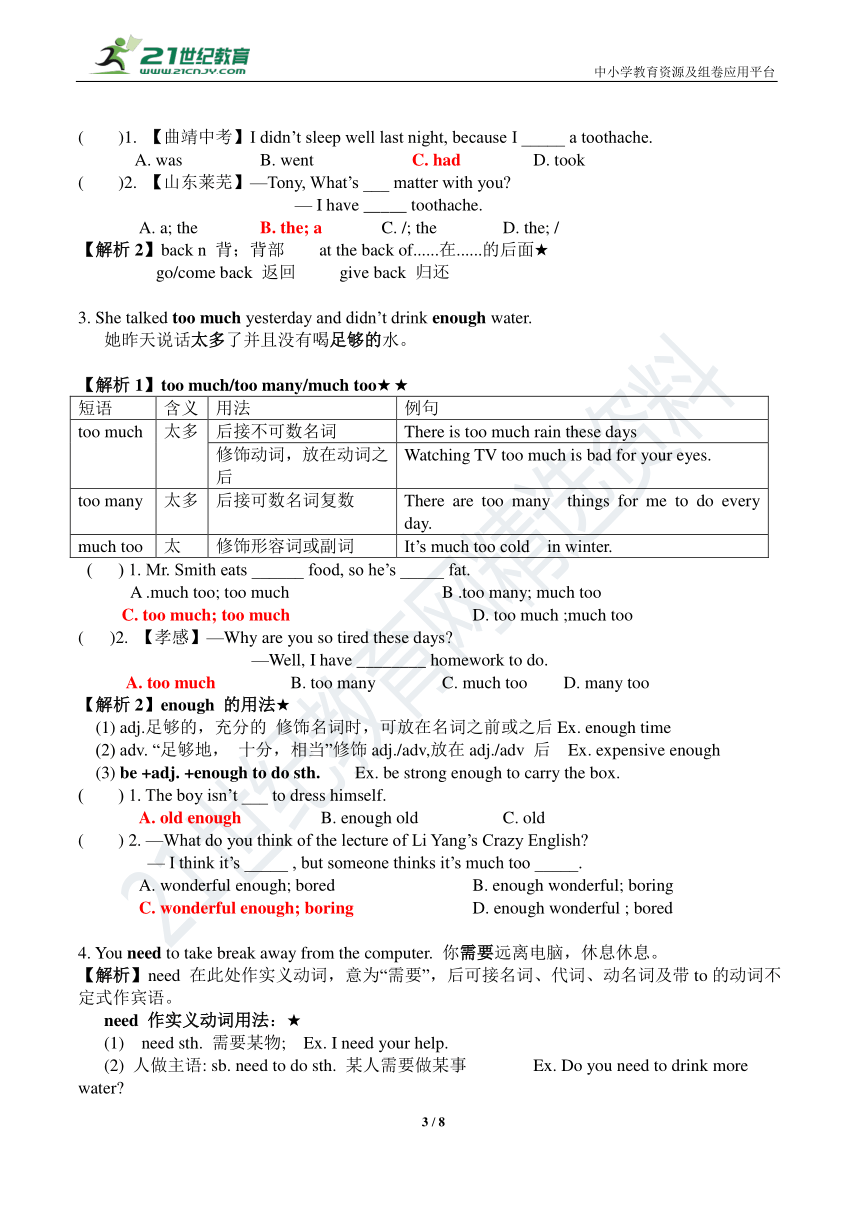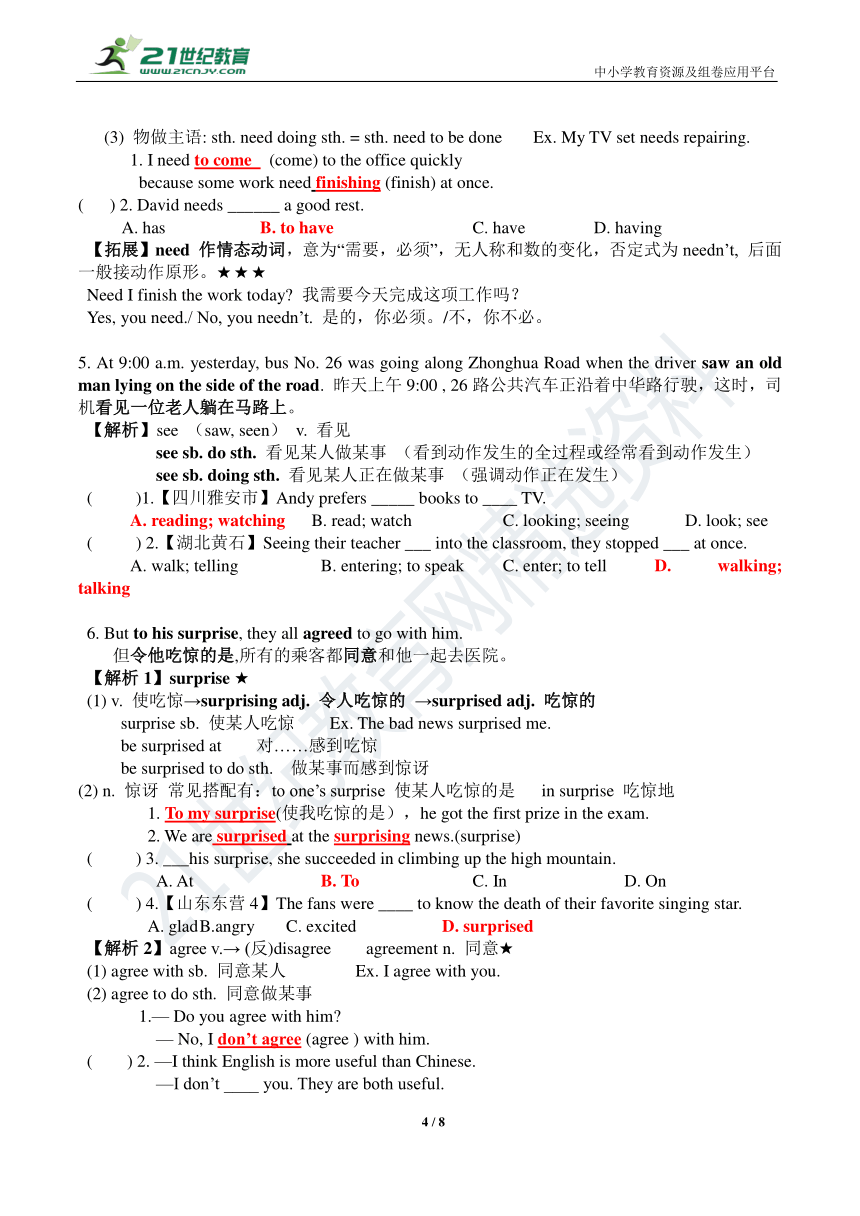Unit 1 What’s the matter? 单元知识点讲义
文档属性
| 名称 | Unit 1 What’s the matter? 单元知识点讲义 |  | |
| 格式 | zip | ||
| 文件大小 | 1.2MB | ||
| 资源类型 | 试卷 | ||
| 版本资源 | 人教新目标(Go for it)版 | ||
| 科目 | 英语 | ||
| 更新时间 | 2020-02-03 20:50:45 | ||
图片预览




文档简介
中小学教育资源及组卷应用平台
Unit1 What’s the matter?讲义
一、词性转换
Section A
lie → (pt.)lay
she → (反身代词) herself
they→(反身代词) themselves
passenger→ (pl.) passengers
Section B
knife → (pl.) knives
breathe → (n.) breath
climber → (V.) climb
death → (v.) die
decision → (v.) decide
importance →(adj.)important
mean → (pt.) meant
二、短语归纳
1. have a toothache 牙疼
2. talk too much 说得太多
3. drink enough water
喝足够的水
4. have a cold 受凉;感冒
5. have a stomachache 胃疼
6. have a sore back 背疼
7. have a sore throat 喉咙痛
8. lie down 躺下
9. get an X-ray 拍X 光片
10. take one’s temperature
量体温
11. in the same way
以同样的方式
12. put some medicine on sth. 在……上面敷药
13. shout for help 大声呼救
14. without thinking twice
没有多想
15. have a heart problem
有心脏病
16. to one’s surprise
使......惊讶的
17. thanks to 多亏了 ;由于
18. in time 及时
19. save a life 挽救生命
20. get into trouble 造成麻烦
21. because of 由于
22. hurt oneself 受伤
23. put a bandage on sth.
用绷带包扎
24. feel sick 感到恶心
25. have a nosebleed 流鼻血
26. cut his knee 割伤他的膝盖
27. have problems in breathing
呼吸困难
28. be used to doing sth.
习惯做某事
29. run out (of) 用完;用尽
30. be in control of 掌管;管理
31. in a difficult situation
在困境中
32. keep on doing sth.
继续或坚持做某事
33. make a decision 做出决定
34. take risks 冒险
35. give up 放弃
三.句型集萃
need to do sth. 需要去做某事
see sb. doing sth. 看见某人正在做某事
ask sb. sth. 询问某人某事
expect sb. to do sth. 期望某人做某事
agree to do sth. 统一做某事
help sb. to (do) sth. 帮助某人做某事
want to do sth. 想要做某事
tell sb. to do sth. 告诉某人做某事
have problems (in) doing sth. 做某事有困难
be/get used to do sth. 习惯于做某事
use sth. to do sth. 用某物去做某事
seem to do sth. 好像做某事
keep on doing sth. 继续做某事
14. mind doing sth. 介意做某事
四、重点句子
1. What’s the matter? 怎么啦?出什么事情了?★
【解析】matter n.问题;事情,常用于句型What’s the matter(with sb. )中。用来询问某人患了何种疾病或遇到了何种麻烦。
Ex. — What’s the matter with you? — I have a bad cold.
其他类似表达:
What’ s the matter with sb.?
= What’s the trouble with sb.?
= What’ s wrong with sb.?
matter 和trouble 为名词,其前可加the 或形容词性物主代词,
wrong 是adj.不能加the
( )—_________?
— I have a headache and I don’t feel like eating anything.
How are you B. What can I do for you
C. What’s the matter with you D. How do you like it
【拓展】matter可作不及物动词,意为“要紧;有关系”
常见用法:It doesn’t matter. 没关系 (用来回答别人道歉时的用语)
( )【湖北武汉】—I’m very sorry. I broke your tea cup.
—__________.
A. It doesn’t matter B. You’d better not
C. Take it easy D. It’s too bad
2. I have a cold. 我感冒了。
I have a stomachache. 我患胃痛。
I have a sore back. 我背痛。
【解析1】have a cold. 受凉;感冒★
have a/an + 疾病名词 “患……病” (cold/fever/cough)
have a sore throat 患喉咙痛 have a sore back 患背痛
have a fever 发烧 have a cold =catch a cold 患感冒
have a stomachache 患胃痛 have a toothache患牙痛
have a headache 患头痛 have a backache患背痛
( )1. 【曲靖中考】I didn’t sleep well last night, because I _____ a toothache.
A. was B. went C. had D. took
( )2. 【山东莱芜】—Tony, What’s ___ matter with you?
— I have _____ toothache.
A. a; the B. the; a C. /; the D. the; /
【解析2】back n 背;背部 at the back of......在......的后面★
go/come back 返回 give back 归还
3. She talked too much yesterday and didn’t drink enough water.
她昨天说话太多了并且没有喝足够的水。
【解析1】too much/too many/much too★★
短语 含义 用法 例句
too much 太多 后接不可数名词 There is too much rain these days
修饰动词,放在动词之后 Watching TV too much is bad for your eyes.
too many 太多 后接可数名词复数 There are too many things for me to do every day.
much too 太 修饰形容词或副词 It’s much too cold in winter.
( ) 1. Mr. Smith eats ______ food, so he’s _____ fat.
A .much too; too much B .too many; much too
C. too much; too much D. too much ;much too
( )2. 【孝感】—Why are you so tired these days?
—Well, I have ________ homework to do.
A. too much B. too many C. much too D. many too
【解析2】enough 的用法★
(1) adj.足够的,充分的 修饰名词时,可放在名词之前或之后Ex. enough time
(2) adv. “足够地, 十分,相当”修饰adj./adv,放在adj./adv 后 Ex. expensive enough
(3) be +adj. +enough to do sth. Ex. be strong enough to carry the box.
( ) 1. The boy isn’t ___ to dress himself.
A. old enough B. enough old C. old
( ) 2. —What do you think of the lecture of Li Yang’s Crazy English?
— I think it’s _____ , but someone thinks it’s much too _____.
A. wonderful enough; bored B. enough wonderful; boring
C. wonderful enough; boring D. enough wonderful ; bored
4. You need to take break away from the computer. 你需要远离电脑,休息休息。
【解析】need 在此处作实义动词,意为“需要”,后可接名词、代词、动名词及带to的动词不定式作宾语。
need 作实义动词用法:★
(1) need sth. 需要某物; Ex. I need your help.
(2) 人做主语: sb. need to do sth. 某人需要做某事 Ex. Do you need to drink more water?
(3) 物做主语: sth. need doing sth. = sth. need to be done Ex. My TV set needs repairing.
1. I need to come (come) to the office quickly
because some work need finishing (finish) at once.
( ) 2. David needs ______ a good rest.
A. has B. to have C. have D. having
【拓展】need 作情态动词,意为“需要,必须”,无人称和数的变化,否定式为needn’t, 后面一般接动作原形。★★★
Need I finish the work today? 我需要今天完成这项工作吗?
Yes, you need./ No, you needn’t. 是的,你必须。/不,你不必。
5. At 9:00 a.m. yesterday, bus No. 26 was going along Zhonghua Road when the driver saw an old man lying on the side of the road. 昨天上午9:00 , 26路公共汽车正沿着中华路行驶,这时,司机看见一位老人躺在马路上。
【解析】see (saw, seen) v. 看见
see sb. do sth. 看见某人做某事 (看到动作发生的全过程或经常看到动作发生)
see sb. doing sth. 看见某人正在做某事 (强调动作正在发生)
( )1.【四川雅安市】Andy prefers _____ books to ____ TV.
A. reading; watching B. read; watch C. looking; seeing D. look; see
( ) 2.【湖北黄石】Seeing their teacher ___ into the classroom, they stopped ___ at once.
A. walk; telling B. entering; to speak C. enter; to tell D. walking; talking
6. But to his surprise, they all agreed to go with him.
但令他吃惊的是,所有的乘客都同意和他一起去医院。
【解析1】surprise ★
(1) v. 使吃惊→surprising adj. 令人吃惊的 →surprised adj. 吃惊的
surprise sb. 使某人吃惊 Ex. The bad news surprised me.
be surprised at 对……感到吃惊
be surprised to do sth. 做某事而感到惊讶
(2) n. 惊讶 常见搭配有:to one’s surprise 使某人吃惊的是 in surprise 吃惊地
1. To my surprise(使我吃惊的是),he got the first prize in the exam.
2. We are surprised at the surprising news.(surprise)
( ) 3. ___his surprise, she succeeded in climbing up the high mountain.
A. At B. To C. In D. On
( ) 4.【山东东营4】The fans were ____ to know the death of their favorite singing star.
A. glad B.angry C. excited D. surprised
【解析2】agree v.→ (反)disagree agreement n. 同意★
(1) agree with sb. 同意某人 Ex. I agree with you.
(2) agree to do sth. 同意做某事
1.— Do you agree with him?
— No, I don’t agree (agree ) with him.
( ) 2. —I think English is more useful than Chinese.
—I don’t ____ you. They are both useful.
A. get on with B. catch up with C. talk with D. agree with
7. As a mountain climber, Aron is used to taking risks. 作为一名登山者,阿伦习惯于冒险。
【解析】be used to (doing)习惯于(做);适应于(做)★★
【用法】(1) use v.使用→useful adj. 有用的 常用词组:use up 用完
(2) use sth. to do sth. 用某物做某事
Ex. We use Internet to find (find) information.
(3) used to do sth. 过去常常做某事,表示过去做过的事现在已经不做,只用于过去时态。
Ex. I used to get up at six.
(4) be /get used to doing sth. 习惯于做某事
Ex. My grandpa is used to living (live) in country.
(5) be used to do sth. 被用来做某事=be used for doing sth.
Ex. Stamps are used to post (post) letters.
【记】He used to wear glasses . But now he is used to wearing contact lenses.
他以前常戴(框架)眼镜,但现在习惯戴隐形眼镜。
( )【湖北随州】—How does Jack usually go to work?
—He ______ drive a car, but now he ______ there to lose weight.
A. used to; is used to walk B. was used to; is used to walking
C. was used to; is used to walk D. used to; is used to walking
8. Then, with his left arm, he bandaged himself so that he would not lose too much blood.
然后, 他用左手给自己绑上绷带, 以至于不流太多的血。★
【解析】so that 以便,为了… 引导目的状语从句, 从句常出现情态动词may/ might .can/ could等
Ex. The boy spoke loudly so that everyone could hear him clearly.
为了能赶上车,她起得很早。(目的状语从句)
( ) 【广东河源】The teacher speaks very loudly ____ all the students can hear her.
A. so that B. because C. since D. when
9. His love for mountain climbing is so great that he kept on climbing mountains even after this experience. 他是如此的热爱爬山以至于经历这次事故之后,他仍然继续爬山。★
【解析1】so …that 如此…..以至……
“so +adj.+ that” “如此……以至……” 引导结果状语从句, so后面接形容词、副词
Ex. He was so strong that he could lift the heavy bag.
( )【江苏镇江】Some word puzzles in this book are ____ difficult that ____ students can
solve them.
A. such; few B. such; little C. so; few D. so; little
【解析2】 keep on (doing sth.) 继续或坚持做某事 ,但是中间有间断
We must keep on working hard in the coming new year.
10. In this book, Aron tells of the importance of making good decision, and of being in control of one’s life. 在这本书里,阿伦讲述了好好做出决定以及掌握自己命运的重要性。
【解析1】 important adj. 重要的(反)unimportant→ importance n 重要性★
My parents have taught me the importance (…..的重要性)of working hard.
【解析2】decide v. 决定→-decision n 决定★
(1)decide to do sth,= make up one’s mind to do sth. 决定做某事
(2)make a decision 做决定
1.Tom decided to study (study) English well.
2.The next morning Alice made a decision (decide).She would tell her mother the truth.
( ) 3.【四川南充】The classroom was so dirty . I decided ____.
A. clean it up B. to clean it up C. clean up it
五、重点语法
1. 情态动词should的用法
(1) should 是情态动词,意为“应该;应当”,否定式为shouldn’t, 其后接动词原形,无人称和数的变化。should not=shouldn’t 不应该
主语+should/shouldn’t +动词原形
You should lie down and rest. 你应该躺下来休息一会儿。
You shouldn’t go out at night. 你晚上不应该出去。
You shouldn’t watch TV. 你不应该看电视。
(2) should 用于主语为第一人称的疑问句,表示征询意见。
Should I put some medicine on it? 我应当给它敷上药吗?
Should we tell her about it? 我们应该告诉她这件事吗?
( )【山西】A country has dreams. We teenagers ________ also have dreams.
A. may B. must C. should
2. 反身代词
(1)反身代词的意义:表示反射或强调自己的代词叫反身代词,意为“自己,本身”;为加强语气,常译为“亲自”。
(2)反身代词的构成:
第一人称、第二人称的反身代词:形容词性物主代词+self/selves构成
单数 myself yourself
复数 ourselves yourselves
第三人称的反身代词:第三人称宾格+self/selves
单数: himself herself itself
复数: themselves
(3)反身代词的用法
①作宾语
Ex. He fell down and hurt himself. 他摔到了,伤了自己。
We should take care of ourselves. 我们应该照顾好我们自己。
②作表语
Ex. Just be yourself. 做你自己就好了。
③作主语或宾语的同位语,加强语气
Ex. She herself will fly to London tomorrow. (主语同位语)
You may go and ask the teacher himself. (宾语同位语)
(4)反身代词常见搭配:
enjoy oneself=have fun =have a good time玩得高兴
teach oneself=learn …by oneself 自学
by oneself =alone 独自
help oneself to 随便吃
introduce oneself to 自我介绍
(5)注意:反身代词必须与人称保持一致。
人称 数 第一人称 第二人称 第三人称
单数 myself yourself himself herself itself
复数 ourselves yourselves themselves
( )1.【浙江温州】—I’ll have a tennis game tomorrow. I’m a little bit nervous.
—Believe in ______ . You’re the best in our club.
A. herself B. myself C. yourself D. himself
( )2.【2017山东聊城】— Jim, please help ______ to some bread .
—Thank you.
A. himself B. yourself C. herself D. myself
真题演练:
( )1.【江苏宿迁】Peter enjoyed at his birthday party last night.
A. he B. him C. himself D. his
( ) 2.【连云港】—I’m afraid I’ll fail in this exam.
—Come on, Philip. You must believe in ________.
A. yourself B. himself C. herself D. myself
( )3.【福建晋江】—Who teaches __________English?
—No one. I teach __________.
A. you; myself B. your; myself C. you; me
( )4.【江苏盐城】—How was your visit to the World Park in Beijing?
—Wonderful! We enjoyed very much.
A. itself B. myself C. yourselves D. ourselves
( )5.【江苏苏州】—I don’t care what my teachers think.
—Well, you________.
A. could B. would C. should D. might
( )6.【江西南昌】一How was the youth club last night, Mark?
一It was great fun. You _____ come.
A. must B. can C. should D. may
( )7.【哈尔滨】 In order to speak English better, we be afraid of losing face. Because the most important thing is to practice. Remember, practice makes perfect.
A. should B. shouldn't C. have to
( )8.【安徽】You _____ drive your car so fast. It’s very dangerous.
A. wouldn’t B. shouldn’t C. couldn’t D. mightn’t
56 / 122
同课章节目录
- Unit 1 What's the matter?
- Section A
- Section B
- Unit 2 I'll help to clean up the city parks.
- Section A
- Section B
- Unit 3 Could you please clean your room?
- Section A
- Section B
- Unit 4 Why don't you talk to your parents?
- Section A
- Section B
- Unit 5 What were you doing when the rainstorm came
- Section A
- Section B
- Review of Units 1-5
- Unit 6 An old man tried to move the mountains.
- Section A
- Section B
- Unit 7 What's the highest mountain in the world?
- Section A
- Section B
- Unit 8 Have you read Treasure Island yet?
- Section A
- Section B
- Unit 9 Have you ever been to a museum?
- Section A
- Section B
- Unit 10 I've had this bike for three years.
- Section A
- Section B
